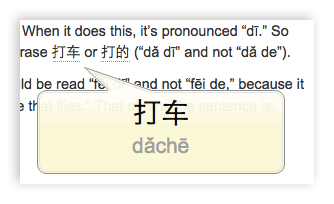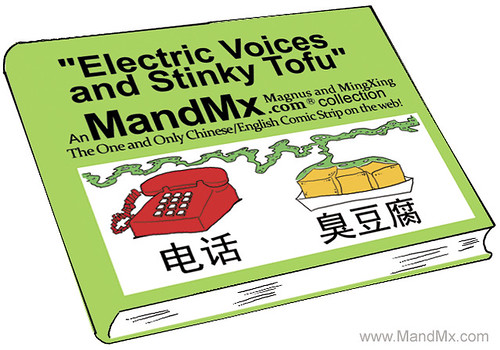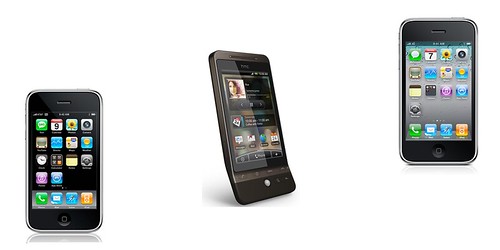01
Nov 2010Fox Intercultural Consulting’s Clever Logo
I love logos that play with Chinese characters, and so I really like Fox Intercultural Consulting‘s logo. Here it is (with breakdown):
I never noticed that 咸 looks so much like the word “Fox”! Nice discovery. (Those of you that like to nitpick will notice some discrepancies, though.)
But then, isn’t it kind of weird to use a character that means “salty” for one’s company logo? It turns out that the character 咸 has quite a history, and can mean a lot more than just “salty.”
From Wenlin:
> The character 咸, from 戌 (xū) ‘destroy’ and 口 (kǒu) ‘mouth’, originally meant ‘bite’.
>> “戌 to hurt 口 with the mouth” –Karlgren.
> Then 咸 was borrowed for a word meaning ‘all, entirely’ (now rare), which happened to be pronounced the same. 咸 xián is also the name of the hexagram ䷞, variously translated as ‘Influence’ (Legge), ‘Wooing’ (Wilhelm), and ‘Cutting’ (Kerson Huang).
> The full form for xián ‘salty’ is 鹹, composed of 鹵 (lǔ) ‘salt’ and 咸 xián phonetic. 鹹 is simplified to 咸 by dropping 鹵, so now 咸 most commonly occurs as the simple form for xián ‘salty’.
More on hexagram ䷞ from Wikipedia:
> Hexagram 31 is named 咸 (xián), “Conjoining”. Other variations include “influence (wooing)” and “feelings”. Its inner trigram is ☶ (艮 gèn) bound = (山) mountain, and its outer trigram is ☱ (兌 duì) open = (澤) swamp.
So not only does 咸 represent one of the hexagrams from the I Ching, but its meaning is actually pretty relevant to Fox Intercultural Consulting’s business. Not too shabby!
With this post I’ve started using the tag “characterplay,” and also tagged previous relevant entries. Characterplay is a lot like wordplay, except that characterplay is entirely visual, whereas wordplay often relies on homophones which, when spelled out, are often quite distinct.
27
Oct 2010WooChinese Does Q&A
My friend John Biesnecker has been working hard on a new site called WooChinese. He’s been covering a lot of topics related to learning Chinese, and has been specifically addressing some of the big questions that absolute beginners to the language typically have. Here are some samples from the “Questions Newbies Ask” series:
– QNA #1: Do I really need to learn to read Chinese?
– QNA #2: Do tones really matter?
– QNA #3: Should I learn traditional Chinese or simplified Chinese characters?
– QNA #4: Do I need to learn to write Chinese characters?
Last week he asked me for some help on the question, “what is the best textbook?” Honestly, that’s a really hard question and it is affected by so many factors, so the default answer is the always-annoying, “it depends.” This is the kind of thing I tackle in a very personalized way through AllSet Learning.
Still, it’s nice to have a relatively straightforward answer (even in imperfect starting point is better than a never-ending search for perfection), so I gave my answer here:
– QNA #9: What’s the best textbook for learning Chinese?
Be sure to check out WooChinese. Lots of good stuff over there.
25
Oct 2010Learners as Experts
Hank recently turned me onto Kirsten Winkler’s blog, which is full of thought-provoking material for modern educators. One article I especially enjoyed recently was Leaving the Stage: Teaching and Learning in the Digital Age. It totally resonated with both my experience at ChinesePod as well as what I’m doing now at AllSet Learning.
Some choice quotes:
> The impact of digital learners on twenty-first century learning environments—including the traditional classroom—highlights the changing role of teachers who, in teaching digital natives, discover that the learners appear to have taken control of the learning process.
> In responding to these changes, what is expected of teachers? Will they simply pursue the traditional model—ignoring their learners’ overnight forays on the web—and assume that time and patience will restore the conventional roles of teacher and student? Perhaps they attempt to master the new technologies themselves, believing they can (or should) equal or even surpass their students’ expertise in navigating online learning environments. Or will teachers and learners together negotiate other possibilities for teaching learners in the digital age?
> […]
> In the past decade, however, the introduction of personal digital devices and a range of new web-based search tools and social media have woven a bold new thread into the discussion of “expertise” in the classroom: namely, the appearance of digital-native students who imagine that their ability to conduct extensive online searches, grab and store what they find, and rapidly share the information with each other qualifies them as experts, too.
At ChinesePod, we produce a lot of lessons, and at the forefront of the academic oversight is the question, “is this material appropriate for this level?” It’s a decision that never goes away, and even after 5 years, it’s not easy. After 5 years, though, experience does help a lot.
I certainly can’t deny that user input at ChinesePod has been enormously instructive in helping us shape the service. Especially when certain requests are made en masse, the way forward can be very clear. When a minority requests changes that will affect everyone, however, we have to be a lot more careful about acting or not acting on them.
Anyway, it was good seeing this article, which points out a change I’m already witnessing, and also highlights a new source of friction. Friction is good, though. Sometimes it leads to blisters, but it also leads to those smooth shiny spots.
19
Oct 2010Carl Gene is on a Roll
I recently came across Carl Gene’s blog, which he describes as “My Journey from Translation Student to Working Professional.” This is a great example of learning by teaching and sharing. Not only is this a great resource for students of Chinese, but I’m sure Carl is benefiting tremendously from the work he’s doing to research and organize this information.
Here are some of the examples of the entries Carl has been writing:
– 20 Actually Useful Chengyu (成语)
– 23 Actually Useful Proverbs (谚语)
– 31 Words For Idiot In Chinese
– 12 “Untranslatable” Words In Chinese
When your goal is to be a professional translator, it’s important to pay attention to the nuances of different words, and it looks like Carl is off to a good start. If you’re just starting out and trying to learn basic Chinese, this probably won’t be the best approach to start with, but definitely at least check out Carl’s blog.
Related Sinosplice Content:
18
Oct 2010Busy Moving AllSet Learning Office
I’ve been very busy this past week with AllSet Learning. The growth of the business has necessitated a new full(er)-time assistant whom I’ve been busy training, and at the same time, our host office, Xindanwei, has just moved. That means the AllSet Learning office is now located in Shanghai’s trendy French concession area. If you’ve been delaying your visit because our previous location was not cool enough for you, your wait is over. The new address is:
> No. 50 Yongjia Road
> Shanghai, China
> 中国上海市永嘉路50号
Here’s a shot of the new location:
I put a few more shots on the AllSet Learning News blog.
Anyway, I’m returning to blogging as usual on Sinosplice this week!
08
Oct 2010Get Sinosplice Tooltips from the WordPress Plugin Directory
The Sinosplice Tooltips WordPress Plugin is now downloadable from the public WordPress Plugin Directory. I’m not sure why it doesn’t yet show up in searches (either on through WordPress site, or through the WP admin plugin section), but you can still download and install it. I’d like to thank Andy Warmack, the developer, for his time and dedication to making this plugin happen and helping me to provide it for free.
And now a little bit of clarification on what the plugin does, for those that are interested.
What the plugin does:
– Adds the CSS and javascript to create attractive tooltips for Chinese like this: 中文
– Adds a quicktag to the HTML mode of the WordPress post editor, allowing you to add tooltip content as easily as you add a link
– Provides settings so that you can control the color and content (to a limited degree) of the tooltip
– Adds tooltip data into your post HTML in a standards-compliant way that degrades gracefully if the necessary javascript or CSS is not supported
What the plugin doesn’t do:
– Automate the addition of pinyin to Chinese words (it’s all manual at this point, for full control)
– Draw on any kind of dictionary data
– Convert numerical pinyin (pin1yin1) to tone mark pinyin (pīnyīn); I recommend my friend Mark’s Pinyin Input Firefox Extension for that, which works fine with the WordPress HTML editor
Download away! If you install the plugin and decide to keep using it, please leave me a comment so that I can see how it looks on other sites. Thanks!
04
Oct 2010Taxi: a Semantic Gloss in English of a Chinese Character
Take a look at this Shanghai subway advertisement for plane tickets on Taobao. Pay attention to the main Chinese words in the ad.
If you’re anything like me (and a few of the Chinese people I asked), you tried to read the Chinese before paying attention the English “taxi,” but started feeling something was strange around the “飞的” part. What’s going on here?
Well, in Mandarin Chinese, the character 的 is most commonly used as a structural particle, connecting different parts of speech together or doing other structural things. In this capacity, it is pronounced “de.” However, the character 的 has a number of other readings as well.
Aside from its purely grammatical function, 的 also appears in the loanword for “taxi,” which is 的士 (díshì) in Mandarin, a secondhand borrowing from the Cantonese “dik1si2” (a loanword from English). In Mandarin Chinese 的 can also represent the meaning “taxi” by itself. When it does this, it’s pronounced “dī.” So you can say “take a taxi” using the phrase 打车 or 打的 (“dǎ dī” and not “dǎ de”).
Anyway, in this ad, the 飞的 part should be read “fēi dī” and not “fēi de,” because it stands for “flying taxi” rather than “one that flies.” That means the sentence is:
> 打个飞的去旅行
So while you might, at first glance, be tempted to read it as, “take something that flies to go traveling” (which is grammatical, albeit a bit awkward), the correct translation is, “take a flying taxi to go traveling.” This is indicated by the “TAXI” above the 的, which tells us the character means taxi (not structural info), and therefore should be pronounced “dī.”
The interesting parts:
1. This was so potentially confusing that a gloss had to be given to a Chinese audience
2. The gloss given was an English word, indicating not the reading of the character, but the meaning of the character
When you think of a gloss for Asian languages, you tend to think of something like this (taken from the Wikipedia page on ruby characters):
I think the ad above is the first time I’ve ever seen a semantic gloss in a foreign language, intended for native speakers of the glossed language. Pretty cool! (I’m not sure it’s effective advertising, though…)
28
Sep 2010Ruined by Popularity
I remember when a big new Carrefour supermarket opened down the street from my Shanghai apartment I was quite happy about it at first. The convenience! Everything I needed, including a few imports, and for reasonable prices, right down the street.
As it turns out, that Carrefour was too popular. It was absolutely packed, all the time. I never wanted to go into that madhouse. Eventually I learned that there were certain times when it wasn’t too bad, but that pretty much ruins the convenience factor, right?
The same is true for China’s 7-day holidays. Never mind that the whole “7 days off” thing is a sham for a second — what can you do in 7 days in China? Well, a whole lot, actually. The only problem is that so can much of the rest of the country.
After a few years of experimentation, many of us, both foreign and Chinese, try to get out of China for these 7-day holidays (if affordable tickets can be found), or to lay low and take it easy. An uneventful vacation is better than a crowded, stressful one.
It does make me wonder, though, how well this whole “excessive popularity ruins things when your population is so big” idea is sinking in, and where the problem is going to strike next. (Cars and parking seems like a safe bet.)
Happy National Day Holiday (October 1-7)! I’ll be here in Shanghai.
24
Sep 2010Tooltip Plugin Done (but not quite public)
It took way longer than I planned, but the pinyin plugin is finally done. It works, and I’m already using the beta release on Sinosplice.com now for the tooltips. Here are some samples of what you’ll be able to do when it’s done:
– 中文
– 日本語
– ひらがな
– संस्कृता वाक्
– Español
I went with the yellow style for Sinosplice, but there are 5 styles to choose from (the same five I asked for feedback on before).
The official release is coming soon. I’ll post a link when it’s out.
22
Sep 2010Electric Voices and Stinky Tofu
Magnus of MandMX.com has been busy lately. You may be familiar with his Shanghainese podcast or his bilingual comics (he even did one about Sinosplice once). Anyway, now he’s come out with a book of his English/Chinese comics. It’s called Electric Voices and Stinky Tofu (a reference to the Chinese words 电话 and 臭豆腐).
Magnus was kind enough to give me an advance copy of this book to share my thoughts. I like that the book is bilingual, and that it’s focused entirely on the “foreigner in China experience.” This makes it unique. We foreigners in China all have our photos, our little private whining sessions, our blogs about life in China… but this book takes a lot of those recurring themes and distills them into one convenient collection.
The book isn’t all about being funny… some of it is too true to be funny. And I daresay that most people that have never been to China won’t understand a lot of it. In some ways it’s almost like a reference book of inside jokes. I like that.
Congrats to Magnus on making this book happen. You can order it on his site.
17
Sep 2010In Defense of Hanping (and Android)
Commenter Mark feels I was a bit unfair to Android phones as a Chinese study tool in my recent post, Back to the iPhone (it’s all about Chinese!).
Mark says:
> Have you tried Hanping Pro? It has far more features than the free version. Also, Hanping in super-fast on Android 2.2. [Note: that link doesn’t work in the PRC]
Mark goes on:
> I think the biggest problem here for John is that he’s comparing free Android apps with paid iPhone apps. Also, the iOS app market is about 1 year more mature than the Android market. Android is catching up fast and I would expect the quality and breadth of apps to catch up over the next year.
> Living in China, you don’t see paid apps in the Android Market. Those are generally much better quality than the free apps – especially in niche areas like Chinese learning.
> If you have an Android device and are living in China then all you need to do is put a US/UK/DE etc sim card in your phone (doesn’t have to be active and can connect to Market over wifi) and then you can see/buy whatever paid apps you want. Once you are done, swap back in your Chinese sim card (i.e. you only need to change the sim card when purchasing paid apps, not using them). This is of course a PITA, but its useful to know until Google comes up with a proper long-term solution.
Mark’s right. It’s not that I’m willing to buy iPhone apps and not Android apps, it’s that I can buy iPhone apps in China, but not Android apps (and I’ve tried). I’m not willing to somehow acquire an overseas SIM card just to buy apps. Sorry.
So it’s true… I might not have come to the same conclusion if I weren’t living in China.
> OCR? Google are rumoured to be bringing out an update to Google Goggles soon which will include multi-lingual OCR support (including Chinese). Use it from within any app (SMS, email, dictionary, flashcard etc) so no need for cumbersome copy/paste like you would need to on the iPhone.
> The vastly superior support on Android for inter-app communication is a big advantage over iOS’s “pasteboard” approach and this is very useful in language-learning where you are often juggling multiple apps. Currently, not too many apps take full advantage of this inter-app functionality but this will improve as the Android Market apps mature.
Like I said, I’m fickle. When Android phones become better than the iPhone, I’ll switch back. In the meantime, I’m just waiting for the competition (inlcuding over OCR) to heat up more. This is a very good thing.
10
Sep 2010Shanghai Street Stories Photography + Beer
Although the site is currently moving so you can’t see it, Shanghai Street Stories is an amazing blog featuring photographs of everyday life in Shanghai, each accompanied by a short story. [Update: you can see the blog here.]
Until the new site is up, you can’t easily see the photos online, but if you’re in Shanghai, you can see them in person at the author’s exhibit tomorrow. Details:
> Demolish, Construct, Repeat: Building the Shanghai Dream
> Southern Barbarian in Pudong celebrates the street photography of Sue Anne Tay, a Shanghai-based photographer, focused on the city’s disappearing neighborhoods. Her show contrasts the migrant workers who are building the new Shanghai with the locals whose lives are changing forever, as the city changes. The exhibit will run for a month.
> Launch party: Sept 11, Sat. 3pm to 6pm. SB will have a complimentary wonderful spread of Yunan snacks, beer and wine. Do note that SB has a formidable beer selection!
> Venue: Southern Barbarian (Lujiazui) 南蛮子
B1/F, DBS Building, 1318 Lujiazui Huan Lu, near Dongyuan Lu
陆家嘴环路1318号B1楼, 近东园路
Directions by metro: Take Exit 1 of Lujiazui Metro, cross the road and walk past the Shanghai Ocean Aquarium toward the DBS Building.
[Restaurant map]
> Interview: Sue Anne Tay at Southern Barbarian
> Event flyers: Smart Shanghai, CityWeekend
“Do note that SB has a formidable beer selection!” That’s an understatement.
08
Sep 2010Reclaiming the Word “VCR”
I’ve already admitted before that I watch the Chinese dating show 非诚勿扰. Well, I’m still watching it, and the cultural and linguistic observations are starting to pile up. Today, though, I just wanted to mention one of the ones that strikes me as particularly odd.
In the program, as each male contestant is introduced, several video clips are shown. These videos reveal more about the man’s career and outlook on life, about his attitudes toward love and marriage, etc. Pretty much without exception, each of these short videos is referred to as a “VCR.”
Yes, “VCR.” It’s not a word we use as much anymore, but we still know it to mean “video cassette recorder.” Then what’s going on here? Chinese has a perfectly serviceable word for video: 视频. “Video clip” is 视频片断. Not only that, but the English word “video” is not uncommon among the younger generation. So why add this extra word, VCR, into the mix? Could “VCR” stand for something else in this context?
A search turned up this question and answer:
> 非诚勿扰里面的VCR的全称是什么? [What is “VCR” on Fei Cheng Wu Rao short for?]
> 电视上经常说VCR,.但偶不知道全称是什么,有知道的告诉一声1 [On TV they frequently say “VCR,” but I don’t know what the full term is. Can someone tell me?1]
> VCR是Video Cassette Recorder的缩写 盒式磁带录像机 [VCR is an acronym for Video Cassette Recorder]
> 但是在电视上的总以节目里面 例如某主持人说:“让我们先看一段VCR”这里的VCR的意思是指一个视频片断 [But in the program on TV, like when the host says, “let’s watch a VCR,” the word “VCR” refers to a video clip.]
Anonymous Q&A on the internet doesn’t exactly amount to conclusive evidence, but I’m pretty sure this is what most Chinese watchers of the show will surmise.
Furthermore, when I do a Baidu Images search for VCR, I get more confirmation that the word seems to be used this way (and only one picture on the first page of results which is what I consider to be a “VCR”). Could “VCR” be the next word for “video” in Chinese?
Too weird.
04
Sep 2010MeatPop!
If I were still doing Junk Food Reviews, this would definitely go in one. (But I’m not, so fortunately I don’t have to actually eat this scary-looking thing.)
31
Aug 2010Back to the iPhone (it’s all about Chinese!)
I got a first generation (2G) iPhone in 2008. Then I switched to an Android in 2009. As of this past weekend, I’m back on an iPhone (3GS). Why? I’ll spare you most of the geekery… it’s largely related to Chinese.
The HTC Hero was a pretty solid early Android device. The new smartphones running Android 2.2 are way better now, though. I’m aware of this. It wasn’t just about upgrading hardware and getting the latest OS.
I don’t really care that the iPhone has more apps, snazzier apps, and more games. Unfortunately, with the app advantage the iPhone pulled off another important victory: better apps for learning Chinese. As a learning consultancy, AllSet Learning also recommends various tools for learning Chinese. Well, I’ve got to admit: the iPhone is now the best tool out there for learning Chinese. For myself and for my clients, it’s the phone I need to be using.
Here are the most important factors in my decision to switch back to the iPhone from Android:
iPhone Pros
– The iPhone has quite a few dictionaries available for the student of Chinese. The free ones are decent, but if you’re willing to shell out a little money, you can buy some very good dictionaries. Popular choices include Pleco, Cambridge English-Chinese (not free), iCED, Qingwen, and DianHua.
– Switching between input methods in the iPhone is instant and easy (especially if you only enable English and one Chinese input method). This is something I do so often that even a slight advantage starts to really matter.
– If you’re interested in handwriting recognition for Chinese (and this is a great learning tool in itself), Apple’s solid version of that is built into the OS.
– The ChinesePod app for the iPhone is better than the one for the Android. (This is a trend that’s not particular to ChinesePod.)
– Ummm, have you seen Pleco OCR?
Android Cons
– No good dictionaries. I don’t even know what everyone uses. Hanping? Honestly, until I heard about Hanping (which, although serviceable, is a very basic CC-CEDICT dictionary), I was just using the mobile version of nciku.
– Switching input methods is a bit slow and annoying. It’s tolerable… for a while. But if you do a lot of switching, it gets to you. (Or you might stay in pinyin mode all the time, which also slows you down, since it has no predictive text functionality.)
– It’s getting Pleco someday, but who knows when?
OK, but nothing is totally one-sided… There are a few other points I should mention.
iPhone Cons
– Google Maps is still messed up in Shanghai on the iPhone. What’s up with this? It always places you some 300-500 meters northwest of where you really are. Apple blames Google. (Google Maps works just fine on Android devices in Shanghai.) This is seriously annoying.
Android Pros
– Google Maps just works.
– Recharging with a regular USB cord is so, so nice. (When you forget your cord, you can even borrow a friend’s digital camera USB cable.)
An iPhone 4 that’s usable in Shanghai is still super expensive, which is a major reason why I got a 3GS. The iPhone 3GS and the high-end Android devices are comparably priced. I was tempted to check out one of the Android phones, but I can’t ignore those iPhone advantages. I’m fickle, though… we’ll see how things develop over the next year.
27
Aug 2010Jukuu is interesting
Sinosplice reader Matthew recently introduced me to Jukuu, a database of sample sentences. The Chinese name, 句酷, is a pun on the word 句库, meaning “sentence base,” in the naming tradition of nciku). There are some really interesting things going on on Jukuu. Here’s a screenshot from the results for a search for “get”:
I enjoyed some of those random sentences. Some things worth noting:
– The sample sentences in the screenshot above are all taken from About Face 3, a well-known book on goal-directed design, which has been published in multiple languages.
– Jukuu offers not only multiple translations (grouped by part of speech), but also the distribution of those various parts of speech in its database (that’s what the pie graph at the right represents).
– Jukuu also offers other word forms (词形) for “get” (in this case, “gets,” “getting,” “got,” “gotten,” and even “getable”).
– If you click on one of the translations in the top right, the resulting page shows you sentences with just that translation of “get” (for example, this one for 得到).
– You can get similar results without going the “exact translation route” by just searching for multiple words, in a mix of English and Chinese. (The sentences aren’t censored, either. Have fun with that!)
– If you go to the “get” results page, further down the right column, you also see links for “adjectives frequently preceding this word,” “verbs frequently preceding this word,” “prepositions frequently preceding this word,” and “nouns frequently following this word.”
This kind of thing is a linguist’s dream, and can only be accomplished by corpus analysis with part of speech tagging, which is a ton of work. It’s really cool to see a resource like this publicly available online.
24
Aug 2010Hank and the Taobao Tea Trail
CEO Hank Horkoff over at ChinesePod has been drinking a lot of tea lately. He calls what he’s doing the Taobao Tea Trail. He’s bought a lot of Chinese tea on Taobao, and he’s sampling it all, learning as he goes. He explains:
> Armed with the Chinese-language 茶叶地图 [“tea leaf map”] and 百度百科 [“Baidu Encyclopedia”] I am sampling my way through the spectrum of Chinese teas – more than 85 in all, one a week. I am using Taobao to order the tea leaves and then posting a bit of information, photos and a link to the Taobao merchant here on this blog.
He’s got lots of quality photos, and even Google maps showing what parts of China the different teas come from. If you’re interested in tea, his project is definitely worth a look. (And if you come to the ChinesePod office, you might just be able to sample them yourself!)
Here’s what Hank’s got so far:
- Huang Mountain – Huángshān máo fēng / 黄山毛峰
- Liuan – Liù ān guāpiàn / 六安瓜片
- Qimen – Qí mén hóngchá / 祁门红茶
- Taiping Lake – Tàipíng hóu kuí / 太平猴魁
- Zhangyiyuan Jasmine (张一元花茶)
- Anxi – Tiě guānyīn / 铁观音
- Wuyi Mountain – Dàhóng páo / 大红袍
- Zhenghe – Báiháo yín zhēn / 白毫银针 ***
- Yueyang- Jūnshān yín zhēn / 君山银针
- Anhua – Báishā xī hēi zhuānchá / 白沙溪黑砖茶
- Suzhou – Dōngshān bìluóchūn / 东山碧螺春
- Liyang – Tianmu Lake White Tea (天目湖百茶/Tiānmù hú bǎi chá)
- Wuyuan – Wùyuán mǐng méi / 婺源茗眉
- Emei Mountain – Zhúyèqīng / 竹叶青
- Simao – Pǔěr chá / 普洱茶
- Hangzhou – Xīhú lóngjǐng / 西湖龙井
- Shaoxing – Píngshuǐ zhū chá / 平水珠茶
Judging from the list on the Taobao Tea Trail, there are still quite a few to go…
21
Aug 2010Pinyin Tooltips Plugin Needs Beta Testers
So the pinyin tooltip plugin I’ve mentioned before is coming along a bit more slowly than I had hoped (it’s just a little side project, after all), but it is coming along. It’s almost done.
If you’re interested in being a beta tester, please email me or leave a comment here (leaving your email address, which only I can see).
17
Aug 2010The New Pleco OCR Is Amazing
There has been a bit of a buzz lately among the techy students of Chinese in Shanghai, and it’s all about the new functionality coming to the Pleco iPhone app. From the site:
> We’ve just announced an incredibly cool new feature for the next version of Pleco, 2.2; an OCR (Optical Character Recognition) that lets you point your iPhone’s camera at Chinese characters to look them up “live” (similar to an “augmented reality” system): demo video is here (or here if you can’t access YouTube).
Watch the video. Seriously. This is big.
Basically what the new app allows you to do is to add “popup definitions” to any Chinese you’re reading–even a book. It’s instantaneous. It uses the iPhone camera, but it’s not like taking a photo at all. (It’s more like using 3D goggles… Magical 3D goggles that provide pinyin readings and definitions for Chinese words.)
The technology behind this app is not terribly new… optical character recognition for Chinese characters has been getting steadily better over the years. But no smartphone app has done this well yet, and it’s a bit stunning to see Pleco performing so admirably right out of the gate.
Oh, and more good news from Pleco:
> Also, we’re finally working on an Android version of Pleco, and have just signed a license for our first Classical Chinese dictionary….
Awesome. Congratulations to Michael Love and the rest of the Pleco team.
12
Aug 201010 Year Chinaversary
It appears to be my 10 year Chinaversary. Thanks to all of you that have congratulated me. It feels very weird, because:
1. Everyone knows exactly how long I’ve been in China because of a nerdy little PHP script I put on my blog a while ago (and refuse to take down)
2. I’ve been in China 10 years (China!)
3. I’ve been in China almost a third of my whole life
4. I’ve been in China longer than some of the Chinese kids I see on the street (and their Chinese language skills will soon be overtaking mine, if they haven’t already)
The script actually rounds up when it calculates how long I’ve been in China. (OK, here’s where it gets super nerdy: mouse over the number on the site to get a more precise calculation.) I originally estimated my arrival in China to be August 20th, 2000, but I just dug through some of my dusty digital archives, and I found some old journal entries. I kept an electronic journal in text files before I ever started a blog. (Ah, those are quite amusing.) Anyway, it appears that my arrival was actually closer to August 8th (how auspicious!), although the first entry is dated August 12th, 2000.
So to celebrate my 10th year anniversary, I’ll post a few snippets from my very first observations of “the real China,” posted by a clueless American 22-year-old who could just barely speak a little Chinese…
> Andrew met me at the airport in Shanghai. His driver picked me up. Andrew’s house is REALLY nice… He said it’s like $5000/month, but his dad’s company pays for it all. It’s sort of a gated community outside of Shanghai. They have Chinese security guards at almost every corner of is neighborhood, and a free bus that goes to and from town on the hour. So, basically I spent my time in Shanghai hanging out with Andrew and his friends. We ate REALLY SPICY Sichuan food one night (I really felt it the next morning), had quite a bit to drink, and socialized with some Chinese girls in a bar. It was nice to get an introduction of China from Andrew. I also got a nice little electronic dictionary. It was meant for a Chinese person, but it’s still quite useful.
> The ticket to Hangzhou was only 29RMB (less than $3!) for a 2 hour ride, and some nice middle-aged lady talked to me the whole time despite my broken Chinese. She knew very little English, but that didn’t stop her from talking to me.
> […]
> Hangzhou is a nice enough city, but I’d definitely call it a city, not a town. It’s bigger than I expected — bigger than Tampa. The Chinese insist on calling it medium-sized, I guess because it doesn’t fit into the silly elite “big” category which includes only huge cities like Beijing and Shanghai. Anyway, it doesn’t have a subway system — only buses and taxis — but it’s big.
> The Chinese are less curious about me than I expected. After being such a spectacle in Japan, I receive relatively little notice here, even though I’ve seen only a few foreigners here in all my jaunts through the city so far. I’m not sure if that’s a good thing or a bad thing — I guess it just means I have to be more active in my interactions. That’s OK with me, I guess… I hope they don’t prove to be completely UNinterested in me, though, because that could be problematical for me and my hopes here.
> [Editor’s note: in a later entry I write: First, let me correct what I said earlier about Chinese people not being curious. I was wrong. They’re very curious. For some reason, though, they seem less curious when I’m with a Chinese person than when I’m alone. These days I’m getting plenty of “hello!”‘s and stares. So I guess all is well in Asia after all. hehe]
> Besides its size, I do feel a little misinformed about Hangzhou in a few other ways. It’s supposed to be such a beautiful city… I wouldn’t call it an UGLY city (although it does have its ugly points), but the beauty of it just doesn’t strike me so much. The famed West Lake is nice, but again, not dazzling. The famous Hangzhou women (the most beautiful in all of China) haven’t exactly wowed me either, although there are some pretty women here. Maybe they hide their finest. So what it comes down to, I guess, is that I think I’m just in a pretty ordinary Chinese city instead of some rare jewel of a city that I had been led to expect.
> There’s been a fair amount of frustration so far… Small frustration at unfulfilled expectations, but greater ones of the linguistic variety. Frustration because when people talk to me in Chinese, I understand some, but don’t get what they mean. Frustration because when I don’t understand them, they talk to me in English. Frustration because they talk to me in English without even trying Chinese. Frustration because if they would just speak a little slower, I really might get it. Frustration because my vocabulary is really so small. Frustration because all that stuff I learned at UF and then forgot was really, really useful stuff! Frustration because my pronunciation — even for things I’m sure of — is bad.
> But these are the frustrations of a student who JUST arrived in China. I know I have to give myself more time.
“More time” indeed.












